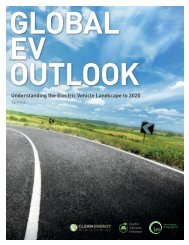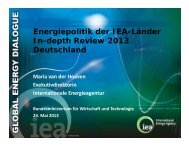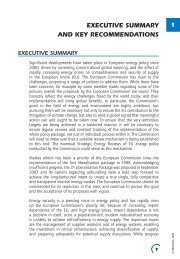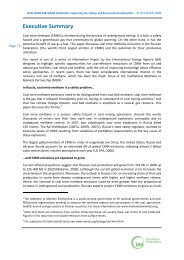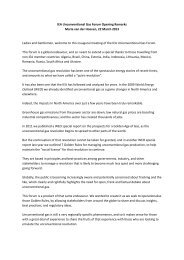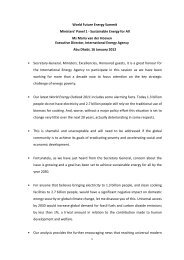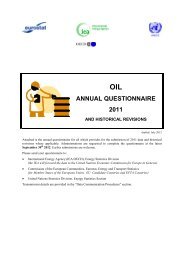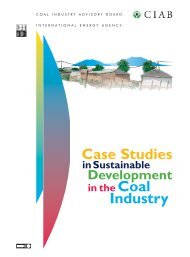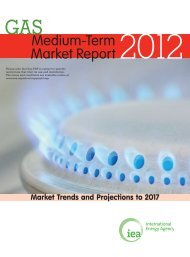OES Annual Report 2012 - Ocean Energy Systems
OES Annual Report 2012 - Ocean Energy Systems
OES Annual Report 2012 - Ocean Energy Systems
Create successful ePaper yourself
Turn your PDF publications into a flip-book with our unique Google optimized e-Paper software.
31<br />
04 / COUNTRY REPORTS<br />
Through the Marine <strong>Energy</strong> Programme Board (MEPB), the Government is actively engaging with the sector<br />
and working with them to realise their potential. The MEPB, which draws together key stakeholders from<br />
across the marine energy sector (energy utilities, industrial companies, technology developers, financiers<br />
and Devolved Administrations), plays a central role in advising Ministers what actions the Programme<br />
should take to advance the industry. The current focus is on enhancing the UK marine energy sector’s ability<br />
to develop and deploy wave and tidal energy devices at commercial scale. Over the past year, the key areas<br />
of focus for the Marine <strong>Energy</strong> Programme Board has been:<br />
ÌÌ<br />
Island transmission charging<br />
ÌÌ<br />
Support needed for small scale arrays and early commercial deployment;<br />
ÌÌ<br />
Planning and consenting issues;<br />
ÌÌ<br />
Knowledge sharing though a Marine Intelligence Network.<br />
ÌÌ<br />
Level of support for marine energy under the reform of the energy market which is to be implemented<br />
in 2014.<br />
The Coalition Government has supported the development of Marine <strong>Energy</strong> Parks (MEPs) across the<br />
UK to help propel the industry forward. MEPs aim to bring together manufacturing, expertise and other<br />
activities to drive the marine sector forward to commercialisation.<br />
There are now two MEPs in the UK; the South West Marine <strong>Energy</strong> Park (SWMEP) which was launched in<br />
January <strong>2012</strong> and the Pentland Firth and Orkney Waters (PFOW) Marine <strong>Energy</strong> Park which was launched in<br />
July <strong>2012</strong>. The SW MEP has since published its business plan and have received initial funding contributions<br />
from a coalition of local partners which will be matched by contributions from the private sector.<br />
The Pentland Firth and Orkney Waters Leadership Forum (PFOWLF) are finalising a marketing and<br />
communications plan to take forward actions agreed upon by the forum. The PFOWLF are currently in talks<br />
with SW Marine <strong>Energy</strong> Park colleagues on a number of proposals which will result in collaboration MEP<br />
work from 2013 onwards.<br />
SCOTLAND<br />
On 30 October <strong>2012</strong> Scotland published the first annual update to our 2020 Routemap for Renewable<br />
<strong>Energy</strong> in Scotland. This progress report provides a summary of developments across the renewables<br />
sector, and includes a new interim target to meet the equivalent of 50% of Scotland’s electricity demand<br />
from renewable sources by 2015 – an important milestone on the journey towards 100% by 2020. Scotland<br />
surpassed its 2011 target of 31% of electricity demand by generating 35% of electricity from renewable<br />
sources that year.<br />
In June <strong>2012</strong>, Scotland also produced its Marine <strong>Energy</strong> Action Plan which detailed the five key elements<br />
around which it would further develop and support the marine renewables industry within Scotland. These<br />
are as follows: 1) Finance, 2) Grid, 3) Infrastructure and Supply Chain, 4) Planning and 5) Europe.<br />
The Marine <strong>Energy</strong> Action Plan, whilst not a government strategy, is an industry led document that<br />
highlights the barriers to the industry whilst identifying solutions to overcome these barriers.<br />
In recognition of Scotland’s wave and tidal potential – 25% of European tidal potential and 10% of its wave<br />
potential – we continue to invest in the infrastructure required to support Scotland’s marine renewables<br />
industry. The European Marine <strong>Energy</strong> Centre (EMEC) has received around £30m of public funding to allow<br />
it to support the testing and development of both wave and tidal devices within Scottish waters.<br />
WALES<br />
In March <strong>2012</strong> the Welsh Government published <strong>Energy</strong> Wales: A Low Carbon Transition which sets<br />
out our ambition to create a low carbon economy that delivers jobs; long term wealth and supports our<br />
communities. Marine <strong>Energy</strong> has been identified as one of the areas of greatest potential to position Wales<br />
at the forefront of key innovation, research and development.<br />
An <strong>Energy</strong> Programme has been established to drive forward the ambitions set out in <strong>Energy</strong> Wales.



